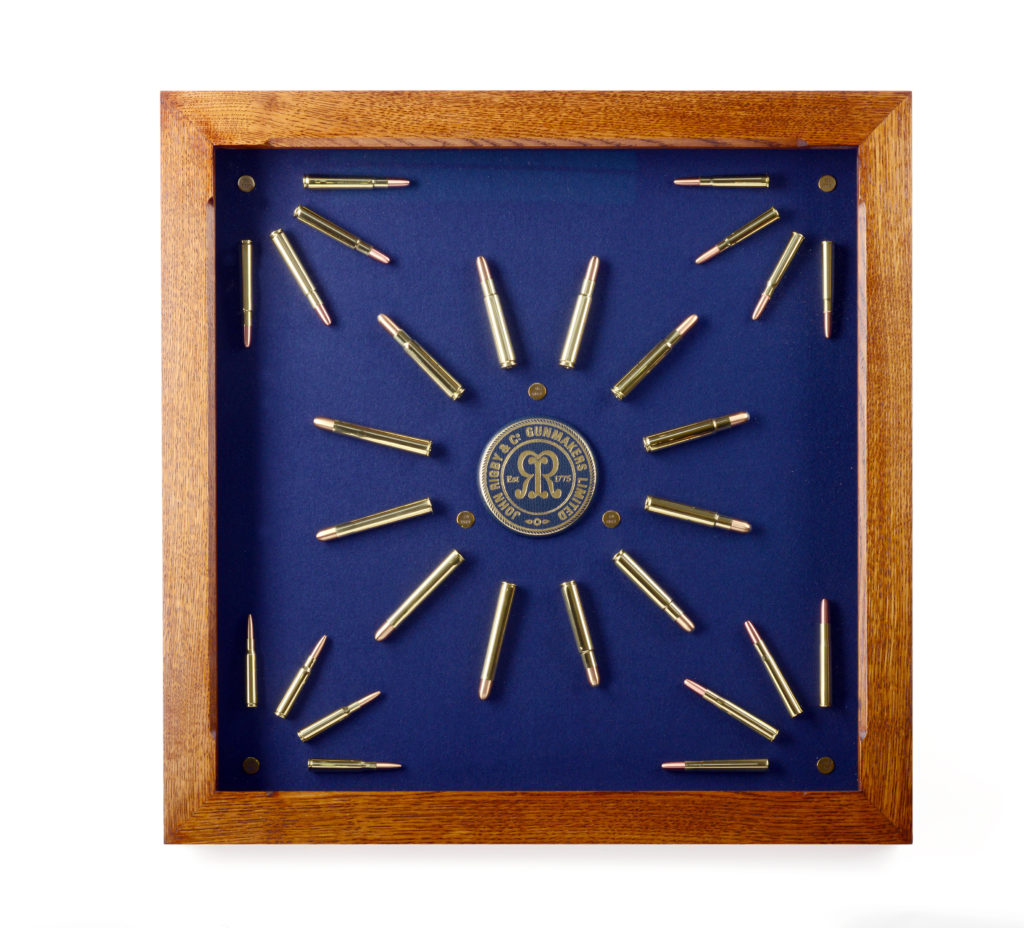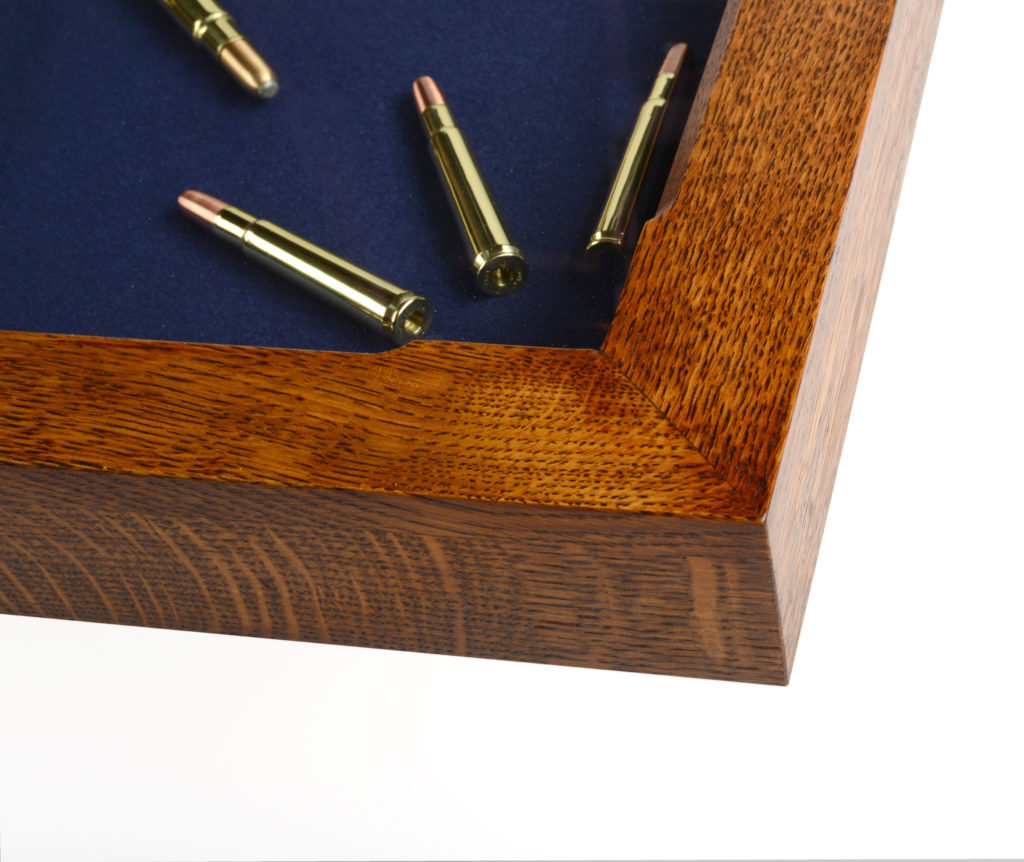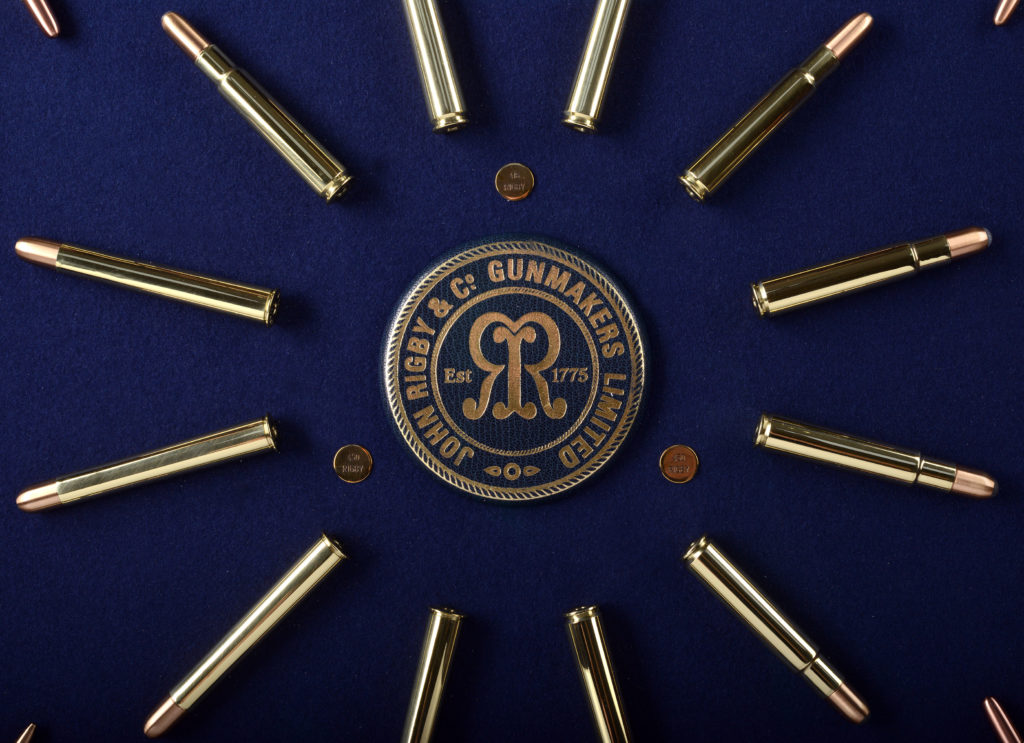It’s all about keeping the integrity of the materials, ensuring the design fits the piece and not taking things too far,” says Stephen Wood when he talks about the stunning rifle ammunition boards he has been making for John Rigby & Co. It’s easy to understand why Stephen was a good fit for the London gunmaker when he talks about his craft, or rather, his many crafts. Stephen works in leather, wood, metal and other precious materials, but his approach to his work is the same, no matter what material he’s using.
A few years ago, Rigby purchased a collection of old rifle cartridges, and approached Stephen to make an ammunition board for them as he had made them many years before whilst working with his father. “Rigby presented me with an interesting problem – there were 92 cartridges to fit on to a board, so I did a few designs for them,” says Stephen. Having been a technician at Wimbledon and then technical manager at Chelsea College of Arts, Stephen has a unique combination of skills and crafts he can call on – as well as an impressive knowledge of techniques and materials. “Making these is quite a process. Every single cartridge has to be taken apart, checked that they were no longer live, then polished, drilled, re-assembled and lacquered,” according to Stephen. All the work on the cartridge is carried out on-site in the Rigby workshop.
The wooden cases themselves, he says, are inspired by the tradesmen’s displays from the Edwardian period: “They had a fantastic design ethic then – quite purist and elegant. It’s the trick of letting materials speak for themselves,” and of course, ammunition boards themselves started out as a tradesman’s display. The woodwork is enhanced and protected by a resin and oil mixture: “It’s all natural, not a commercial spray finish. I apply three layers, maybe four depending on how the oak takes up the oil. Each coat is left to dry overnight, before being rubbed down and another application added. The final finish is buffed up with wax.”
Recently, Stephen has made a few ammunition boards for Rigby clients, using the Rigby rounds. “I use American white oak for the frame, which has a ‘stop chamfer’ running on the inside of it – it’s a very small embellishment, essentially a bevelled edge on the inside of the frame that stops short of the corners. It’s a decoration that has been used pretty continuously since the Middle Ages.” The cartridges are seated on Melton cloth – 100 per cent wool woven in twill, and dyed the Rigby deep blue. The unseen work is the complex geometry that is beneath the baize. It can take up to a day to mark out the holes that position the cases, “Any error, and your eye will spot it immediately,” Stephen adds. The ammunition boards are then finished off with museum-grade non-reflective glass, which has a UV filter to ensure the cloth doesn’t discolour.
The ammunition boards are now going to be available to Rigby clients – with each board custom made and designed according to the client’s wishes. “We can do any number of cartridges, really,” Stephen says. “I recently did one for a client with 24 cartridges, but the one we did for Rigby, with 92, went from a .243 all the way up to a .700 calibre.”
Each ammunition board will be hand-made and unique, and Stephen has become adept at sourcing the most obscure cartridges. Many of them, he says, he obtains from Kynamco, formerly the famous Kynoch company, which incidentally developed the .416 calibre with Rigby. “They have an amazing range of big game cartridges, and they make all the specialist calibres,” says Stephen. “Of course for some of the really obscure calibres, I have to look elsewhere. It can take a while, but I do a lot of trading with collectors, scouring online to find them.” Every calibre is also engraved on a brass disk, and at the centre of the piece is a leather disk embossed with the Rigby logo.
Stephen’s ethos is to achieve “the best”. He elaborates: “A lot of the craftsmanship is in assessing where each step will take you,” Stephen explains. “So you need to be able to understand how the materials you are working with will behave. It sounds strange, but it is like a risk assessment, you have to think about the possible outcome of the next step before you take it. There is just as much, if not more time spent designing, thinking and calculating than in the actual making, and the real test is getting yourself out of trouble when it all goes wrong. The crafts that Stephen is master of are all closely related to gunmaking, and his attitude of achieving perfection certainly matches the Rigby philosophy: “Good enough is never good enough,” he says. “It’s got to be better.”
Rigby’s bespoke ammunition boards are made to the clients’ wishes. Prices available on request.


